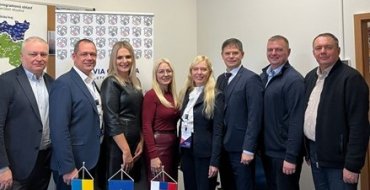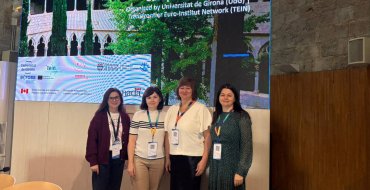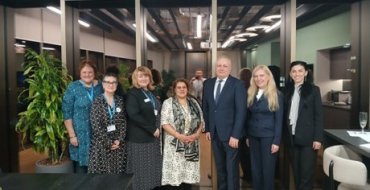UzhNU and Tyrol: new horizons for international cooperation
On Thursday, November 6, Uzhhorod National University welcomed a delegation from the Federal State of Tyrol (Austria) as part of an official visit dedicated to strengthening interregional and academic ties. The event provided a platform for discussing joint educational and scientific initiatives, as well as the development of regional cooperation in the economic, cultural, and agricultural spheres.
The Austrian side was represented by the President of the Tyrolean Landtag, Sonja Ledell-Rosmann, the Honorary Consul of Ukraine in Tyrol, Walter Pehr, heads of the departments of education and health, representatives of educational institutions (the University of Innsbruck and the Tyrolean University of Applied Sciences for Health in Innsbruck) The Ukrainian delegation was led by Vasyl Khymynets, Ambassador Extraordinary and Plenipotentiary of Ukraine to Austria, Roman Saray, Chairman of the Transcarpathian Regional Council, as well as representatives of the regional council, departments of education and health, the Ministry of Foreign Affairs, and UzhNU.

The university was represented by Vice-Rector Ihor Korol, heads of faculties and departments of the Faculty of Philology, Faculty of Foreign Languages, History and International Relations, International Economic Relations, Law, Geography, Engineering and Technology, Faculty of Social Sciences, Faculty of Medicine, Faculty of Health and Physical Education, the Institute of Postgraduate Education and Pre-University Training, as well as the head of the International Relations Department, Oksana Svezhentseva.
The grand opening of the meeting was started by the chairman of the Zakarpattia Regional Council, Roman Saray. He welcomed the foreign guests and noted that this visit is of particular importance, as two years ago a delegation from Tyrol visited the Transcarpathian region, laying the foundation for further cooperation.

Ihor Korol, Vice-Rector of UzhNU, welcomed the Austrian guests and emphasized the strategic importance of the university for the development of the region and international cooperation. He said that UzhNU is among the top 15 best educational and scientific bases in the country: it has 20 faculties and institutes, more than 15,000 students, and actively cooperates with a large number of foreign universities.

“We greatly appreciate the tremendous assistance provided by our international partners during the war. This support allows us to hold back the enemy and also contributes to the development of the region's and the state's economy. The most important thing for us in these collaborations is that they really work and that they simultaneously involve scientific activity and the educational process,” said Ihor Korol.
Sonja Ledell-Rosman, President of the Tyrolean State Parliament, responded to the warm welcome: "Today, we are meeting again here at the university and are pleased to note that we have many areas of common work that will help us overcome today's challenges. We strive not only to strengthen our existing cooperation, but also to open up new areas of interaction. It is good that we are holding this discussion here, within the walls of the university, where we can focus on the fields of science and education."

After Sonya Ledel-Rosman's speech, Volter Peer, Honorary Consul of Ukraine in Tyrol, took the floor. “We are very grateful for being welcomed at the university. Now we will be able to work on key issues and initiatives that are on the agenda of our cooperation,” he said. Volter Peer then introduced the representatives of the Austrian delegation.
Vasyl Khymynets, Ambassador Extraordinary and Plenipotentiary of Ukraine to the Republic of Austria, joined in the official greetings, emphasizing the importance of such visits for the development of interregional cooperation and the strengthening of diplomatic ties.
Mariana Marusynets, Director of the Department of Education, Science, Youth, and Sports of the Transcarpathian Regional State Administration – Regional Military Administration, also expressed her gratitude for the active cooperation and support of educational initiatives.

Oksana Svezhentseva, Head of the International Relations Department at Uzhhorod National University, emphasized the importance of deepening international academic cooperation and developing educational and scientific programs. "Today, the university is actively integrating into the European educational space through participation in consortia and alliances, and the team is implementing joint initiatives with partners from more than 37 countries. Today, our team is implementing more than 20 major international projects, including Erasmus+, Interreg, and Horizon programs, and we continue to develop partnerships with universities in the United States, South Korea, Great Britain, and our long-standing partners and neighbors, the universities of the EU countries. It is important for us to be a university that is constantly improving, reforming educational programs, improving infrastructure, and introducing innovations in scientific and educational activities."
Ms. Oksana added that UzhNU is interested in developing international cooperation through academic mobility, joint educational programs, and scientific conferences supported by grant programs. This approach will allow both universities to introduce innovations, reform educational processes, implement joint international projects, and strengthen their positions in the global educational space.

After the introductory part, the participants began discussing priority areas of cooperation between Zakarpattia and Tyrol. The key areas included philology and cultural studies with academic exchanges and joint scientific research, the implementation of European integration projects to support local self-government, legal and democratic initiatives, spatial planning and regional development issues, as well as medical cooperation covering physical rehabilitation and mental health. For convenience, the participants divided into thematic subgroups, where they were able to exchange contacts and identify specific steps for further development of the partnership in a given direction within a narrow professional circle.

At the end of the meeting, the participants summarized the discussions and confirmed their readiness to actively develop cooperation in priority areas, in particular in education, science, law, regional development, and medicine. They also exchanged symbolic gifts.















